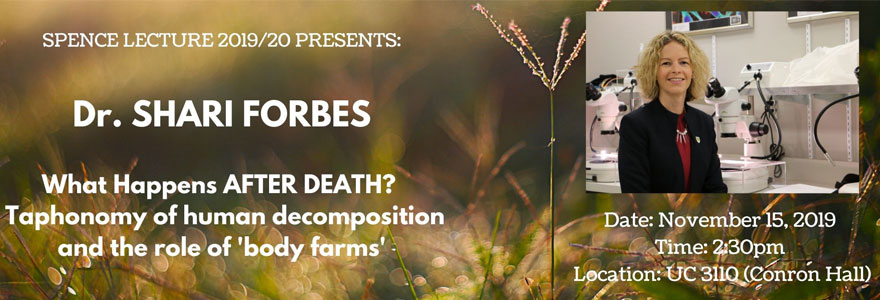News and Updates
Contact
Faculty of Social Science
Social Science Centre
Room 9438
Western University
T. 519-661-2053
F. 519-661-3868
E. social-science@uwo.ca
Spence Lecture to discuss role of body farms in forensics
November 11, 2019
Story by Rob Rombouts
“Does it smell bad?” That is the most common question Dr. Shari Forbes hears about her work.
Forbes is the Director of Canada’s first human decomposition facility, located in Trois-Rivères, Québec. On November 15, Forbes will present the 2019/20 Spence Lecture in the Department of Anthropology, entitled “What happens AFTER death?: Taphonomy of human decomposition and the role of ‘body farms.’”
Human decomposition facilities, more commonly referred to as body farms, are facilities designed to study the effect of natural forces on deceased human bodies, to better understand the process of human decomposition, and to assist police in forensic investigations.
Along with her role as founding director of the body farm, Forbes is a professor in the Department of Chemistry, Biochemistry and Physics as the Université de Québec à Trois-Rivères, and holds the Canada 150 Research Chair in Forensic Thanatology.
The Trois-Rivères facility is the first in Canada. It is one of the few opened outside of the United States, and one of two cold-climate facilities. It will provide unique insight into how cold weather changes the decomposition process.
Forbes, who previously opened a facility in Australia, is interested to know what happens to bodies in different climates.
“I am coming from an area of 40 degree Celsius weather, going to an area where it can get to minus 40 degrees,” said Forbes. “We don’t know what happens to a body in sub-zero temperatures when it is covered in several feet of snow.”
Working in Australia, Forbes was surprised to discover the mummification process that occurred due to the climate. Forbes said the cold climate of the Quebec facility will likely preserve bodies, which delays the decomposition.
“We know that in winter, the body doesn’t decompose. If the body is frozen, it is preserved and the decomposition process takes longer to be initiated when it thaws,” said Forbes. “This changes the entire process; if someone dies in winter, they may not start to decompose until summer and the process will be different than if someone dies in spring or summer.”
While this is generally understood to be true, Forbes thinks her research will show that decomposition still continues through sub-zero temperatures.
Research obtained through body farms can assist forensic experts determine how long someone has been deceased, and how to identify victims. Other research projects focus on enhancing methods used to find human remains, through the use of cadaver dogs and ground penetrating radar, among other tools.
Forbes said the biggest surprise in establishing the facilities is how willing people are to donate their bodies to support the research. The facilities rely on the generosity of the public to donate their bodies to research. In all cases, the focus is to provide law enforcement agencies more tools to solve missing persons and homicide cases, and to provide relief and comfort to the families of victims.
Shari Forbes will deliver the 2019/20 Spence Lecture on Friday, November 15, at 2:30 pm in UC 3110 (Conron Hall). The Spence Lecture is presented by the Department of Anthropology and supported by the Social Science Student Donation Fund.

